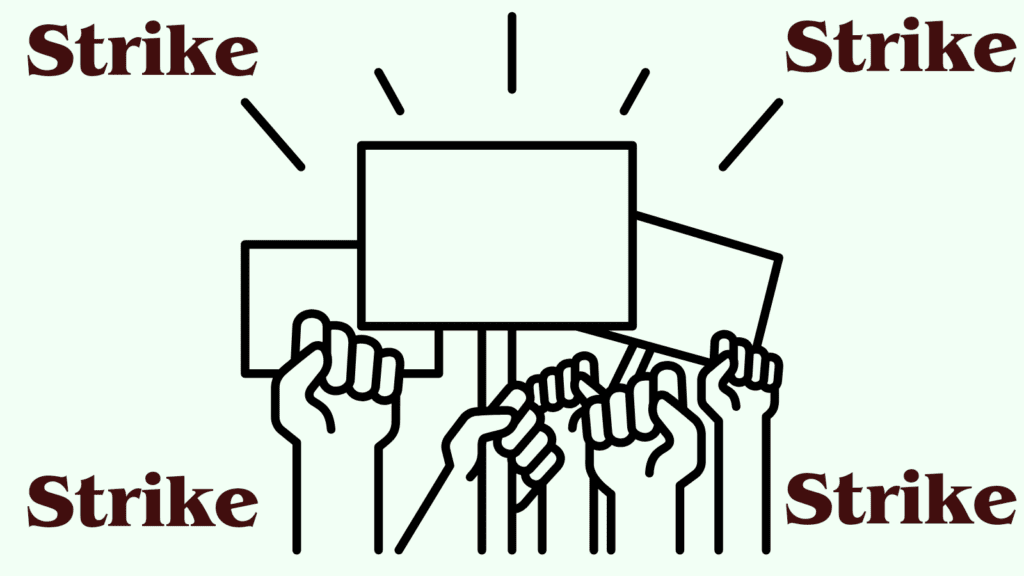The Power of Strikes: How Collective Action Drives Change

Introduction
In the fight for workers’ rights and social justice, strikes have emerged as a formidable tool for driving change. A strike is more than just a temporary work stoppage; it is a potent expression of collective power and unity. Throughout history, strikes have been instrumental in securing improved working conditions, fair wages, and advocating for broader societal changes. In this blog post, we will explore the significance of strikes, their historical impact, and their role in shaping a more just and equitable world.
What is a Strike?
A strike is a form of protest where workers collectively refuse to work, typically aiming to address specific grievances or demand improvements in their working conditions, wages, benefits, or other labor-related issues. This mass withdrawal of labor disrupts business operations and serves as a means of exerting pressure on employers or policymakers.
Historical Milestones of Strikes
Strikes have a rich history dating back to the 19th century. One of the most pivotal moments was the Haymarket Affair in Chicago in 1886, where labor activists fought for an eight-hour workday. Though the event itself turned tragic due to a bombing and subsequent violence, it sparked a global labor movement that eventually led to the establishment of the eight-hour workday in many countries.
Another significant milestone was the 1936-1937 Flint Sit-Down Strike, where American autoworkers occupied their factories to demand union recognition and better working conditions. This landmark event not only resulted in concessions from General Motors but also set the stage for the expansion of labor rights in the United States.
Types of Strikes
Strikes can take various forms, each serving different purposes:
a. General Strikes: Involving workers from different industries and sectors, general strikes aim to bring an entire city or country to a standstill. These strikes have the potential to amplify demands and address broader social issues.
b. Wildcat Strikes: Often spontaneous and unauthorized, wildcat strikes are not officially sanctioned by unions. They usually arise from frustration with the pace of negotiations or immediate workplace concerns.
c. Sympathy Strikes: Also known as solidarity strikes, these are launched by workers in support of another group of striking workers, even if their own grievances are not directly related.
The Impact of Strikes
Strikes have proven time and again to be potent agents of change. Beyond the immediate concessions won by striking workers, they send powerful messages to employers and governments. Some of the impacts include:
a. Collective Bargaining Power: Strikes provide workers with leverage during negotiations, leading to improved wages, benefits, and working conditions.
b. Societal Awareness: Strikes attract media attention, raising awareness about labor issues and social injustices.
c. Legal and Policy Changes: Historic strikes have played a pivotal role in shaping labor laws, ensuring workers’ rights are protected.
d. Strengthening Solidarity: Strikes foster a sense of unity among workers, strengthening their collective voice.
The Role of Technology in Strikes
In the digital age, technology has transformed how strikes are organized and communicated. Social media platforms and instant messaging enable rapid mobilization and support, reaching a wider audience and garnering international solidarity.
Challenges and Opposition
While strikes have proven their effectiveness in driving change, they also face challenges and opposition from various quarters:
a. Legal Hurdles: In some jurisdictions, there are legal restrictions on strikes, making it difficult for workers to exercise their right to collective action.
b. Employer Resistance: Employers often respond to strikes with resistance, seeking to break the strike through replacement workers, legal action, or media campaigns.
c. Public Perception: Strikes can polarize public opinion. Some view them as disruptive or harmful, particularly when essential services are affected. Effective communication and public outreach are vital to gain broader support.
d. Changing Job Landscape: In today’s gig economy and increasing automation, traditional strike tactics may need to adapt to accommodate different forms of employment.
Strikes and Social Justice
Beyond the immediate economic gains for workers, strikes have played a crucial role in advancing social justice causes:
a. Civil Rights Movement: Strikes were pivotal in the Civil Rights Movement, as African American workers fought for equal rights and desegregation.
b. Gender Equality: Strikes have also been used to advocate for gender equality, with women workers demanding fair pay and improved working conditions.
c. Climate Justice: In recent years, climate strikes have gained traction as young activists worldwide demand urgent action on climate change.
d. Racial Justice: Strikes have been utilized to address systemic racism and demand justice in cases of police brutality.
The Future of Strikes
As the world continues to evolve, so too will the nature of strikes. While the core principle of collective action will remain constant, the digital era opens new possibilities for organizing and mobilizing:
a. Online Activism: Virtual strikes and online campaigns can complement traditional strikes, amplifying voices and raising awareness across borders.
b. Intersectionality: Strikes will likely become more intersectional, addressing not only labor-related issues but also interconnected social justice concerns.
c. Global Solidarity: The interconnectedness of the world allows for stronger global solidarity, enabling workers from different countries to support each other’s causes.
Conclusion
strikes have a powerful and storied history as a means of collective action to drive change. From securing workers’ rights and improved conditions to advocating for broader social justice causes, strikes have shaped the world we live in today. As technology continues to advance, strikes are likely to adapt, incorporating online activism, intersectionality, and global solidarity to amplify their impact and create a more just and equitable future for all.
Discover more from HUMANITYUAPD
Subscribe to get the latest posts sent to your email.

